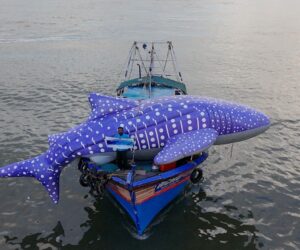A white and black world where transparent plastic plastic bottles are crushed and overlapped
getty
Global talks on plastic pollution in Geneva have collapsed once again last Sunday. After nearly two weeks — and three years of negotiations — countries could not agree on whether to cap plastic production or settle for focusing on waste and recycling. Are we stuck with the status quo, which has proven to be unsustainable for the health of people and planet? Or is ProSocial AI opening an alternative path, with some countries positioned to step into a leadership role?
For business leaders, this isn’t distant geopolitics. The implications are direct. The OECD projects that global plastics use and waste could almost triple by 2060 without stronger policy, driving compliance costs and reputational risk higher. At the same time as the International Energy Agency notes that petrochemicals, including plastics, are now one of the biggest drivers of rising oil demand — explaining why some producers resist production caps, the United Nations Development Program raises alarm about the costs of microplastic for human health.
Dire Perspectives
Rarely do the consequences of political choices feel less theoretical. Microplastics have been detected in the bodies of humans, animals, oceans and planets — evidence that exposure is systemic. It is weakening ecosystems that supply clean water, fertile soil and climate stability. Oceans and rivers clogged with plastics disrupt food chains, while burning plastic waste releases toxins and greenhouse gases. What once seemed a waste issue has become both a planetary boundary problem and a public health liability.
For companies, waiting for global consensus means waiting inside a fog of uncertainty. With plastics tied to oil demand growth, businesses face ever more fragmented regulations, rising compliance costs and sharper scrutiny from consumers who increasingly see plastics not just as waste, but as a health risk. The question becomes: why not face the inevitable and prepare for the future now?
Stalemate Or A Window Of Opportunity?
The political paralysis also opens a window of opportunity. ProSocial AI — artificial intelligence tailored, trained, tested and targeted to serve both people and planet — can turn uncertainty into leadership. This isn’t philanthropy; it’s strategic innovation, risk mitigation, and a new frontier of market advantage.
What ProSocial AI Means
Not all AI is equal. ProSocial AI is different. It’s:
- Tailored to local needs — factories, cities, watersheds.
- Trained on high-integrity data aligned with social and environmental goals.
- Tested for real-world impact — not just vanity pilots.
- Targeted at root causes — production, design, system change — rather than downstream cleanup.
A win-win-win-win for the people we are, the business we manage, the country we are part of and the planet we depend on.
Here’s how that translates into measurable advantages.
1) Cut emissions where they start
Methane drives a big chunk of near-term warming, and it used to be “invisible.” Now, MethaneSAT + Google marry satellite data with AI to detect, attribute and publish leaks so operators can fix the worst first — cutting product loss and regulatory risk.
AI also makes clean megawatt-hours more schedulable. DeepMind’s wind-power forecasting improved the market value of wind by enabling day-ahead commitments — good for grids and profits.
2) Designing Out Waste Before It Exists
Recycling treats symptoms; design treats causes. Using AI-guided protein engineering, researchers created FAST-PETase, an enzyme that breaks down PET (bottles, packaging, textiles) into reusable building blocks far faster than conventional processes — pointing toward circular, higher-value materials. It has yet to be scaled, but illustrates the potential of AI that is deliberately used for planetary friendly solutions.
3) Proving Claims, Not Just Making New Ones
Customers and regulators now want proof: where materials came from, how much is recycled, and where products end up. AI-enabled tracking and verification can turn the label of ESG – environment, sustainability, governance – from an empty decoration narrative into auditable performance, shrinking fraud risk and speeding certification.
4) Protecting The Natural Assets That Protect Us
Forests, rivers and wetlands are business infrastructure — flood control, clean water, climate resilience. AI on satellite and sensor data can spot illegal dumping or deforestation early, preventing damage that later shows up as supply shocks, insurance claims, or lost social license.
Plastics Are Not” Just” An Environment Issue
In 2022 scientists have first detected microplastics in human blood and the evidence base is expanding since. That takes plastics from a “waste problem” to a potential liability problem for brands and insurers. In 2024 microplastics were found in every human placenta tested in a 62-sample study, underscoring concerns about exposure pathways.
The direction of travel is straightforward: pressure will keep moving upstream toward production limits, additive bans and traceable circularity. Companies that get ahead with ProSocial AI will be positioned as solution-makers — not defendants. The same holds true for countries.
Malaysia: Blocker… And Potential Pioneer
Malaysia sits in a place of tension.
The pro – On one hand, it is a producer of oil and gas and in Geneva the loudest resistance to production caps came from fossil-aligned nations. Civil society has also raised concerns about industry-linked voices in Malaysia’s delegation, reinforcing the impression of a country holding the brakes.
The contra – On the other hand, Malaysia has declared an inspiring ambition to be an AI Nation. The aspiration has substance: a National AI Office, an AI Nation framework, and concrete steps such as a national cloud system, the ASEAN AI Summit and ILMU — a homegrown multimodal language model. These initiatives point to a government not only adopting technology but committing to shape it.
The opportunity – This dual identity can become a strength. If Malaysia chose to apply AI to its environmental and industrial challenges, it could move from being seen as a blocker to being recognized as a test bed for solutions. The path is not abstract. AI can verify recycled content and leakage prevention, enforce standards transparently against illegal dumping or land clearing, support the design of new circular materials, and cut energy use in factories and buildings. When paired with financial tools that reward prevention, these steps create both savings and exportable expertise.
Part of the potential lies in how Malaysia develops its people alongside its technology. By investing in hybrid intelligence — the mix of human creativity, judgment, and ethics with machine speed and scale — Malaysia could give itself an edge that is difficult to copy. Schools and institutions are central here. Teaching double literacy — combining human literacy, a holistic understanding of self and society, people and planet; with algorithmic literacy – a candid comprehension of what AI is, how it works and why, prepares humans that can co-exist with machines without losing their agency, staying on course to the values that they have embraced.
From Plastic Failure To Playbook
The collapse in Geneva is frustrating. But it also makes the choice for individuals and institutions more apparent: don’t wait for consensus — act regionally and corporately with the tools already available. ProSocial AI is not “tech for tech’s sake.” It’s a practical playbook for reducing risk and building resilience. It turns invisible leaks into visible data, shifts value toward predictable clean power and moves circularity from slogan to science. And it matches what the evidence already shows: plastic and oil are unsustainable; waiting only compounds the costs.
Malaysia’s choice mirrors the decision many economies face: stay tethered to fossil-era habits or lead with regenerative intent, leveraging an AI-Nation strategy with a ProSocial AI angle to chart the path that global politics cannot yet agree on. The planet will not wait forever.
The A-Frame: A Simple Way To Act On “Abstract” Issues
When climate, plastics, or AI feel distant, the A-Frame can help ground decisions:
Awareness — These risks are already inside our air, water, and products.
Appreciation — Natural systems are assets. Value them before they are gone.
Acceptance — Fossil-era mindsets will not carry growth into the next decade. Using technology to replicate yesterday’s model won’t deliver tomorrow’s outcomes.
Accountability — Incentives should be tied to prevention and verifiable results. Use AI not to entrench the old system, but to build a resilient new one.
The Geneva gridlock in plastic negotiations is just one more reminder that leadership in a hybrid era requires a conscious shift: to see long-term issues as near-term opportunities. The choice is intriguing — step in as a builder of systemic change or remain a bystander as the transformation happens to you.









